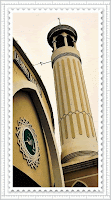How many Muslims are in Mozambique? Of all Eastern African countries, it is harder to get reliable, proper figures on the number of Muslims in this very fertile, green country. There are many Muslims in Mozambique; their number can be any where between 20% to 40% of the population. Whatever the number is, today, Islam is growing rapidly in the country; especially in the north, along the coast and in the urban areas. Mainly through trade, which very sadly included that of salves, this very well endowed land has a very long history with Islam; no one knows exactly when Islam entered Mozambique; most probably in the 7th Century when Arabs, who referred to Mozambique as
Bilad As Sufalaa and later as
Musanbi'h, started trading with Eastern Africa and to as far as Madagascar; by the 13th Century there were many Arab dominated
city-states including the one at Sofala. Mozambique has had a very painful past with the struggle for independence; it is still struggling to build its infrastructure and a working democracy. In this very delightful country, there are many mosques; old and new:
 |
| Masjid, Inhambane |
Inhambane was one of the first Arab influenced trade centers and one of the first places in Mozambique where Islam spread. And mosques were built. The name Mozambique, is said to have been derived from Musa Al Biq or Musa Bin Biq or Musa Mbiqi or Musa Maliq which was the name of the sultan on Ilha De Mozambique (Island of Mozambique). Deriving from that, the Portuguese applied the name to the whole country which they occupied then.
 |
| Masjid, Inhambane |
In Mozambique, Muslims and mosques have a long history dating back to hundreds of years. Some of the early Muslim settlements here, like in Sofala and Beira, were ruled by shaikhs appointed by the Sultan of Kilwa. By the beginning of the 19th century, there were many mosques in most of the main trading centers of the country.
 |
| Masjid, Quelimane |
In the olden days, Quelimane was ruled by a
sultan. It
is a large town today. The few mosques that are here are rather small and need better maintenance. The town too, could do with a better, larger mosque. On all the main islands off the coast of Mozambique, there are many Muslims. It is from these Islands and the main Muslim dominated trade centers on the coast, that Islam was spread inwards by mainly people of mixed Arab and African blood; and by indigenous Mozambicans.
 |
| Ilha de Mozambique |
Ilha de Mozambique or
Island of Mozambique, was a major Arab port long before the Portuguese arrived here; and was once, before Maputo, the capital of Mozambique. Its unique and remarkable Arab and Portuguese architecture of stone and
macuti reed, has put it on
UNESCOs World Heritage List; it has the oldest European building in the Southern hemisphere.
 |
| Masjid, Ilha de Mozambique |
Almost all of the Island's population is Muslim. The old dilapidated streets here, which now require much repairs, restoration and maintenance, are narrow and Hadhramesque. Like of Muslims in all East Africa, the
maulid is an important part of Islamic festivities on this island.
 |
| Jam'ia Mosque, Maputo |
By the middle of the 15th century, Islam had spread all the way to the Zambezi. In the 19th Century, notable among the converts, were the Yao tribe; most of whose chiefs had converted to Islam. From long ago, Arabs have been some of the most influential Muslims in the North of Mozambique; and Indians have had more influence in the south, especially in the capital city: Maputo. In the last 10-15 years, Islam has been made stronger in the city by the arrival of North Africans and other Middle Eastern Arabs; funding for Muslim projects by wealthy Gulf Arab countries, has been most helpful too.
 |
| Masjid Taqwa, maputo |
Many agencies from the Gulf and South Africa are now assisting with the building of mosques and Islamic educational institutions. Today, there are many prominent Muslim Mozambicans; including members of parliament.
 |
| Masjid, Maputo |
As in all Eastern African countries, the Hadharem, from
Hadhrmaut, played a very important role in introducing Islam to Mozambique; together with the Omanis and Iranians. Later Indians and Pakistanis helped in strengthening Islam and spreading it even further. When the Portuguese arrived and colonized Mozambique in the 16th Century, not only did Muslim dominance end but the Portuguese, retaliating against centuries of Muslim occupation of Portugal, treated Muslims with an iron fist; some times, whole Muslim populations were slaughtered under one pretext or another. This discrimination and suppressive way did not stop Islam from spreading and flourishing; by the 1960s, Muslims from Mozambique were journeying to Tanzania, Kenya and even as far as Saudi Arabia, to seek Islamic knowledge. Today, reflecting on how much the situation has changed for the better for Muslims: the main Islamic occasions of
Eid El Fit'r and
Eid Al Ad'ha are recognized as national holidays; and Mozambique, since 1994, one of the only two Eastern African countries, is a member of the Organization of the Islamic Conference
.
+
Islam Finder
+ Muslim Population
+ Muslim Population
+ Picasa
+ Flickr 









